Choosing a home for Obama library an ongoing battle
By Starla Muhammad -Assistant Editor- | Last updated: Jan 22, 2015 - 9:47:28 AMWhat's your opinion on this article?
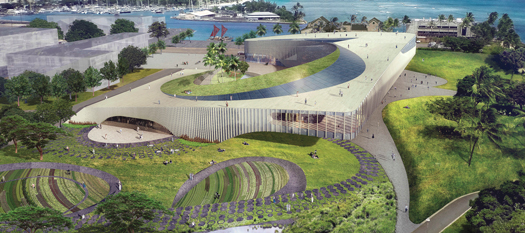
This undated artist rendering provided by Stryker Weiner & Yokota Public Relations, Inc., shows one of the proposals for a Barack Obama presidential library that a Hawaii group wants to build. Officials said, Dec. 11, 2014 the large number of tourists visiting Hawaii and the proposed site’s location on the waterfront between Waikiki and downtown Honolulu on the island of Oahu would bring many to the center. The proposal includes designs from four separate architect teams. Most have vast covered, open-air spaces to take advantage of the state’s cooling trade winds. One vows to harness the state’s abundant sunshine for solar power. Hawaii is competing with bids from Chicago and New York. Photo: AP/Wide World photos
|
CHICAGO (FinalCall.com) - The likelihood of the Barack Obama Presidential Library being awarded to the president’s adopted hometown could be in jeopardy as an anticipated March deadline for the final decision approaches. During two recent public forums in Chicago, residents spoke loud and clear: they want the library and museum. The University of Chicago and University of Illinois at Chicago submitted bids, but both could be on shaky ground.
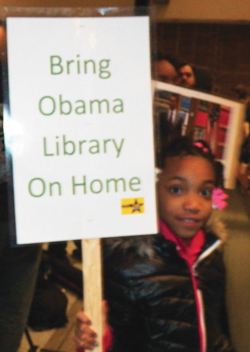
Youngster holding sign in support of the Obama Presidential Library in Chicago. Photo: Starla Muhammad
|
The proposed UIC bid includes a 23-acre parcel of vacant city-owned land on the West Side. Earlier reports said a new incoming university chancellor, board chairman and president had some concerns about the school’s commitment to the project. But the outgoing and new university leadership has publically said UIC’s commitment is firm.
The U of C proposal raised more eyebrows because it would require use of portions of Washington Park or Jackson Park, public land neither the city nor university own. Park commissioners could be required to vote on a transfer of land ownership to the city, which does not appear to be much of a problem on the political side.
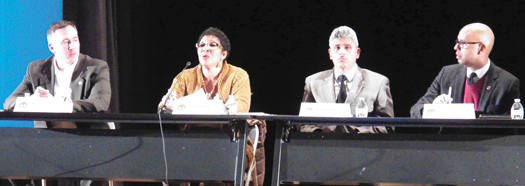
Commissioners from the Chicago Park District at the first of two community meetings held about the proposed sites for the Barack Obama Presidential Library. L-r: Michael P. Kelly, General Superintendent & CEO of the Chicago Park District, Avis LaVelle, Vice-president, Commissioners Juan Salgado and Tim King. Photos: Starla Muhammad
|
Hundreds of residents packed the main auditoriums and overflow rooms at Hyde Park High School Jan. 13 and the Washington Park Field House Jan. 14 to speak directly to representatives of the Chicago Park District Advisory Council regarding the proposed U of C sites.
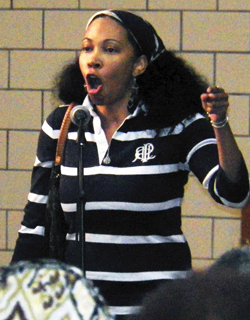
Chicago residents were passionate in making their voices heard during community forums about the Obama Presidential Library.
|
Washington Park and Jackson Park are on the South Side, where Mr. Obama worked as a community organizer before becoming president. The Washington Park site would occupy 22 acres of land inside the park and 11 acres outside of the park. The Jackson Park proposal would require 21 acres. Together both parks consist of 1,055 acres or about 1 percent of total city park land. By comparison the Lyndon B. Johnson Library & Museum sits on 30 acres with a building on 4 acres. The presidential library for Jimmy Carter includes 35 acres with a building on 2.5 acres and the William J. Clinton Library & Museum includes 38 acres with a building on 2 acres.
Critics say U of C, which already owns an empty 11 acre lot on the South Side plus additional land, should have proposed other locations and not advocated using land owned by taxpayers.
“We cannot presume what site the Obama Foundation and the president and first lady will ultimately choose but we do want to do all that we can to help tilt that decision in favor of Chicago at the end of the day,” said Avis LaVelle, vice-president of the Chicago Park District. The Obama Foundation prefers the library land be controlled by the city, she said.
Several members of Chicago’s City Council have formally backed the city’s bid, including Alderman Bob Fioretti. He, however, does not think public land should be used.
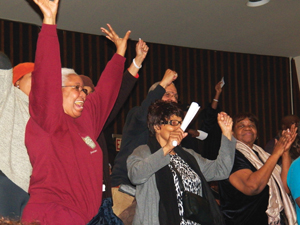
Community residents applaud during Jan. 13 forum at Hyde Park Academy High School.
|
Ald. Fioretti, who is also running for mayor, was critical of current Mayor Rahm Emanuel’s handling of the presidential library process.
“Why are we at a secret behind all of this? There are two bids on the table and unfortunately this (Emanuel) administration has really botched up these deals. They should have assigned somebody to all the bids, a neutral party to make sure we had the strongest bids, whether it’s the UIC one or U of C’s bid period, without using park land,” said Ald. Fioretti. The plan to use park land should have been made public sooner, the alderman added. Despite the controversy he is optimistic the library will ultimately land in Chicago.
Representatives from several community groups, including Friends of the Park, voiced support for the library—but not on public land. The group cited environmental concerns and a potential negative impact on families and public activities in the parks.
“Our goal is to ensure that should either the Washington Park or Jackson Park site be selected by the presidential foundation that the interests of the surrounding communities are protected and that the park itself and the city of Chicago are enhanced by the use of that site if it comes to that,” said Ms. LaVelle. There will also be a stipulation that the park district would retain possession of the land if the library were ever decommissioned, she added.
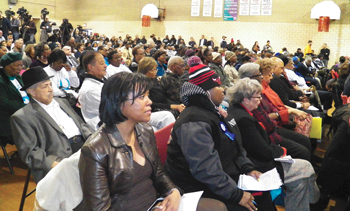
Residents packed the gymnasium at Washington Park Field House at the second community meeting, Jan. 14.
|
During the high spirited and sometimes raucous forums, residents clearly stated economic growth, development, educational opportunities and other perks associated with a presidential library should benefit those who live in the area.
Other supporters of an Obama library in Chicago included business organizations, educators, religious leaders and students.
According to presentations at both forums, the library could draw an estimated 800,000 visitors each year and create 3,300 new local construction jobs with a $600 million economic impact. New businesses which would include hotels, retail stores and restaurants would boast 1,900 permanent local jobs. The impact on the city could be up to $220 million annually, said presenters. Residents called for binding agreements that guarantee locals benefit.
Chicago resident C.M. Winters Palacio, who attended the Hyde Park meeting, agreed. “There’s no reason for us not to get this right,” Ms. Winters Palacio, who is also a college librarian, told The Final Call. “I mean there’s a lot of conversations about the acquisition of public land, gentrification and I think that they are all very valid points and should be taken into consideration,” she added. Her main concern is how the library would impact the rest of the city, especially those who may not have access to it. There are several Chicago Public Schools that do not have libraries. If the museum is awarded to Chicago, Ms. Winters Palacio hopes satellite libraries would be created within the larger presidential library for those children.
She and other attendees said if the U of C proposal is chosen, a much needed trauma center should also be built. There are ongoing protests and anger that U of C does not have a level one trauma center on the South Side, which suffers from a high level of violence.
“That has to be an ‘and’ condition. Yes, we will talk about you getting a library and you really need to fix that trauma center issue once and for all,” said Ms. Winters Palacio.
Cheryl Gibson Eubanks Pope said she has witnessed first-hand the impact presidential libraries have on communities. She has visited four presidential libraries. Revitalization of the Washington Park area where she resides is slow. The presidential library would make it easier to bring much needed economic benefits to the community, said Ms. Pope.
“I don’t think the smart people at the University of Chicago would consider having such a facility as the Obama museum and not consider having a trauma center. You wouldn’t have people coming from all over the world having to go to 95th St. or Northwestern University to get to a trauma center,” she added.
Historically, U of C has not been a good neighbor or friend to the Black community, a resident identified as Mr. Blakemore said to the crowd in one forum. “Will this development make a community agreement with the Black community (that) these jobs, goods, services and contracts will be delivered?” he asked as the audience applauded. “My people don’t go for the okie doke here. Don’t rush. Demand that this Park District have several community meetings, not just these two,” he said.
INSIDE STORIES AND REVIEWS
-
-
About Harriett ... and the Negro Hollywood Road Show
By Rabiah Muhammad, Guest Columnist » Full Story -
Skepticism greets Jay-Z, NFL talk of inspiring change
By Bryan 18X Crawford and Richard B. Muhammad The Final Call Newspaper @TheFinalCall » Full Story -
The painful problem of Black girls and suicide
By Charlene Muhammad -National Correspondent- » Full Story -
Exploitation of Innocence - Report: Perceptions, policies hurting Black girls
By Charlene Muhammad -National Correspondent- » Full Story -
Big Ballin: Big ideas fuel a father’s Big Baller Brand and brash business sense
By Bryan Crawford -Contributing Writer- » Full Story






 Click Here Stay Connected!
Click Here Stay Connected!








